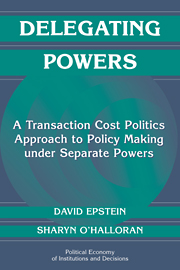Book contents
- Frontmatter
- Contents
- List of Figures and Tables
- Preface
- 1 PATHS OF POLICY MAKING
- 2 CHOOSING HOW TO DECIDE
- 3 TRANSACTION COST POLITICS
- 4 THE DECISION TO DELEGATE
- 5 DATA AND POSTWAR TRENDS
- 6 DELEGATION AND CONGRESSIONAL-EXECUTIVE RELATIONS
- 7 DELEGATION AND LEGISLATIVE ORGANIZATION
- 8 DELEGATION AND ISSUE AREAS
- 9 CONCLUSION
- AN AFTERWORD ON COMPARATIVE INSTITUTIONS
- APPENDICES
- References
- Index
- Titles in the series
6 - DELEGATION AND CONGRESSIONAL-EXECUTIVE RELATIONS
Published online by Cambridge University Press: 02 December 2009
- Frontmatter
- Contents
- List of Figures and Tables
- Preface
- 1 PATHS OF POLICY MAKING
- 2 CHOOSING HOW TO DECIDE
- 3 TRANSACTION COST POLITICS
- 4 THE DECISION TO DELEGATE
- 5 DATA AND POSTWAR TRENDS
- 6 DELEGATION AND CONGRESSIONAL-EXECUTIVE RELATIONS
- 7 DELEGATION AND LEGISLATIVE ORGANIZATION
- 8 DELEGATION AND ISSUE AREAS
- 9 CONCLUSION
- AN AFTERWORD ON COMPARATIVE INSTITUTIONS
- APPENDICES
- References
- Index
- Titles in the series
Summary
Congress and the Presidency are like two gears, each whirling at its own rate of speed. It is not surprising that, on coming together, they often clash.
Polsby, Congress and the PresidencyCongressional–executive relations have long been a favored stomping ground for institutional scholars. The dynamics established by the Article 1, Section 7 game have inspired ruminations on the roles that vetoes, presidential leadership and agenda setting, and interbranch bargaining play in the macropolicy production of the federal government. To this list, we add the observation that one crucial dimension of interbranch negotiations concerns the amount of leeway that Congress admits to the president in the execution of public laws. The model presented in Chapter 4 suggests that, as delegation becomes less attractive in terms of legislators' reelection concerns, Congress will substitute legislative policy making for agency policy making.
In the pages that follow, we test this basic proposition from a number of different angles. We examine whether (1) divided government leads to lower average levels of executive branch discretion; (2) individual members more often vote in favor of delegation to presidents of their own party as opposed to presidents of the opposite party; (3) actual or threatened vetoes increase executive discretion; (4) legislators rely more on federalism and judicial oversight to circumvent the executive during times of divided government; and (5) legislators give power to executive actors further from the president's direct control under divided government.
- Type
- Chapter
- Information
- Delegating PowersA Transaction Cost Politics Approach to Policy Making under Separate Powers, pp. 121 - 162Publisher: Cambridge University PressPrint publication year: 1999



